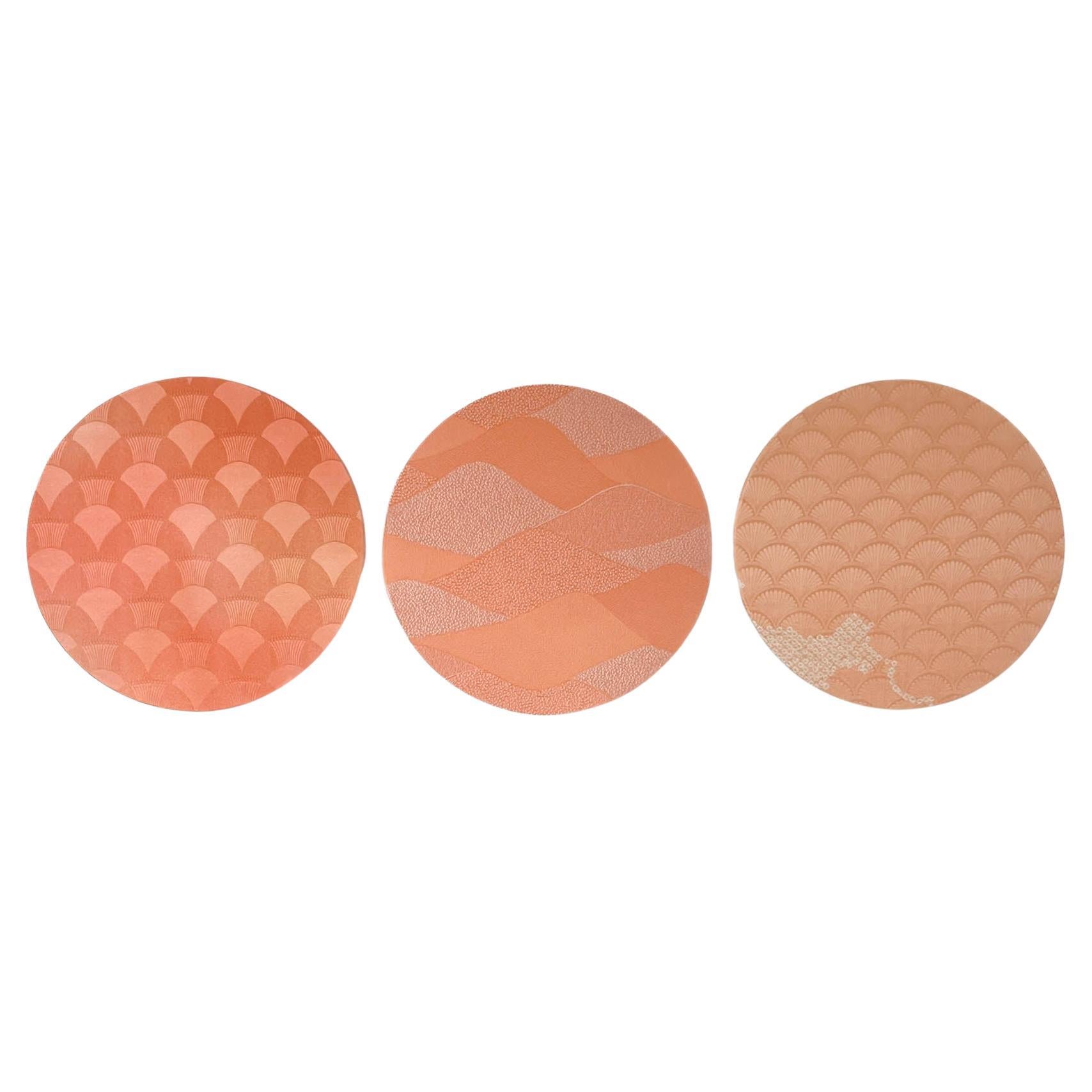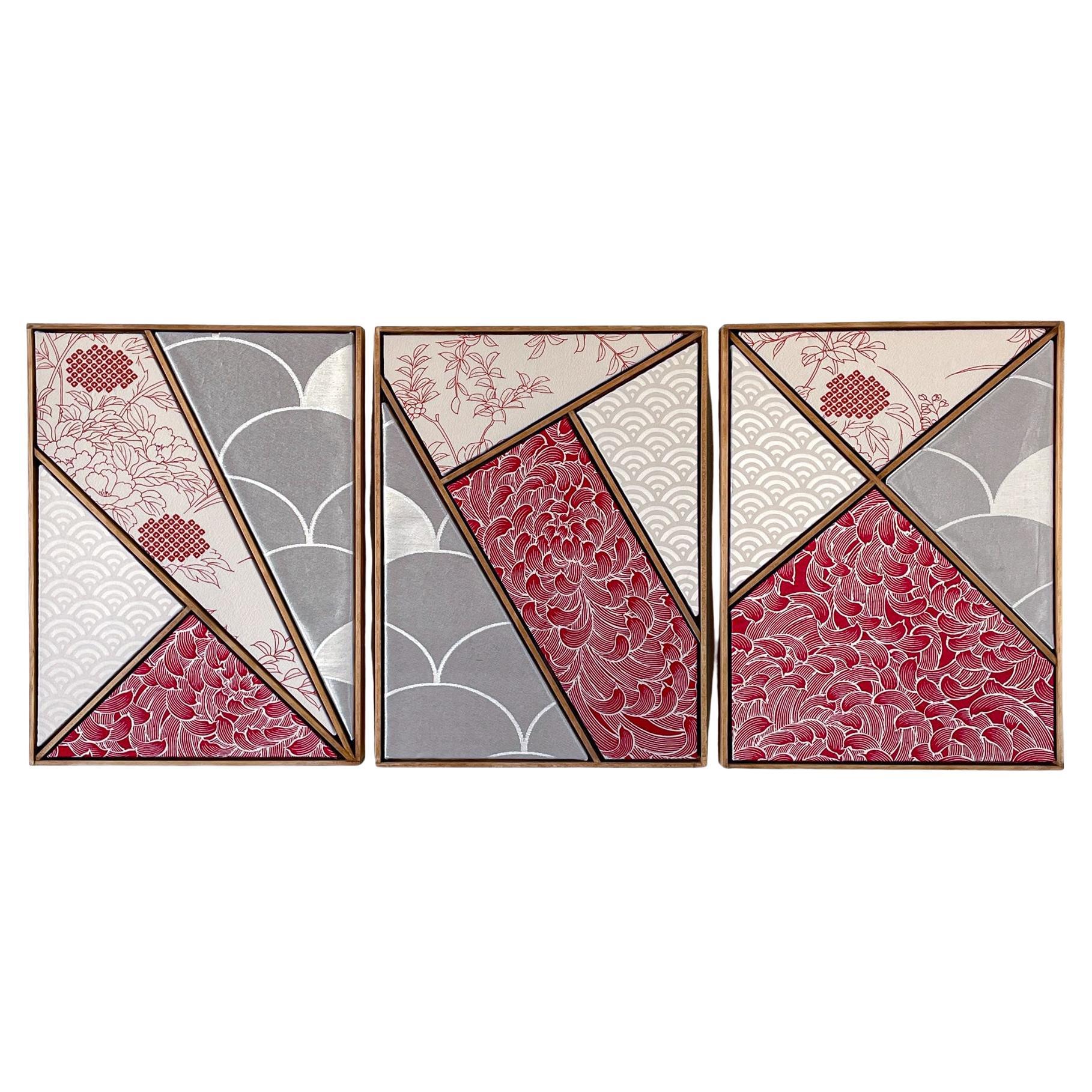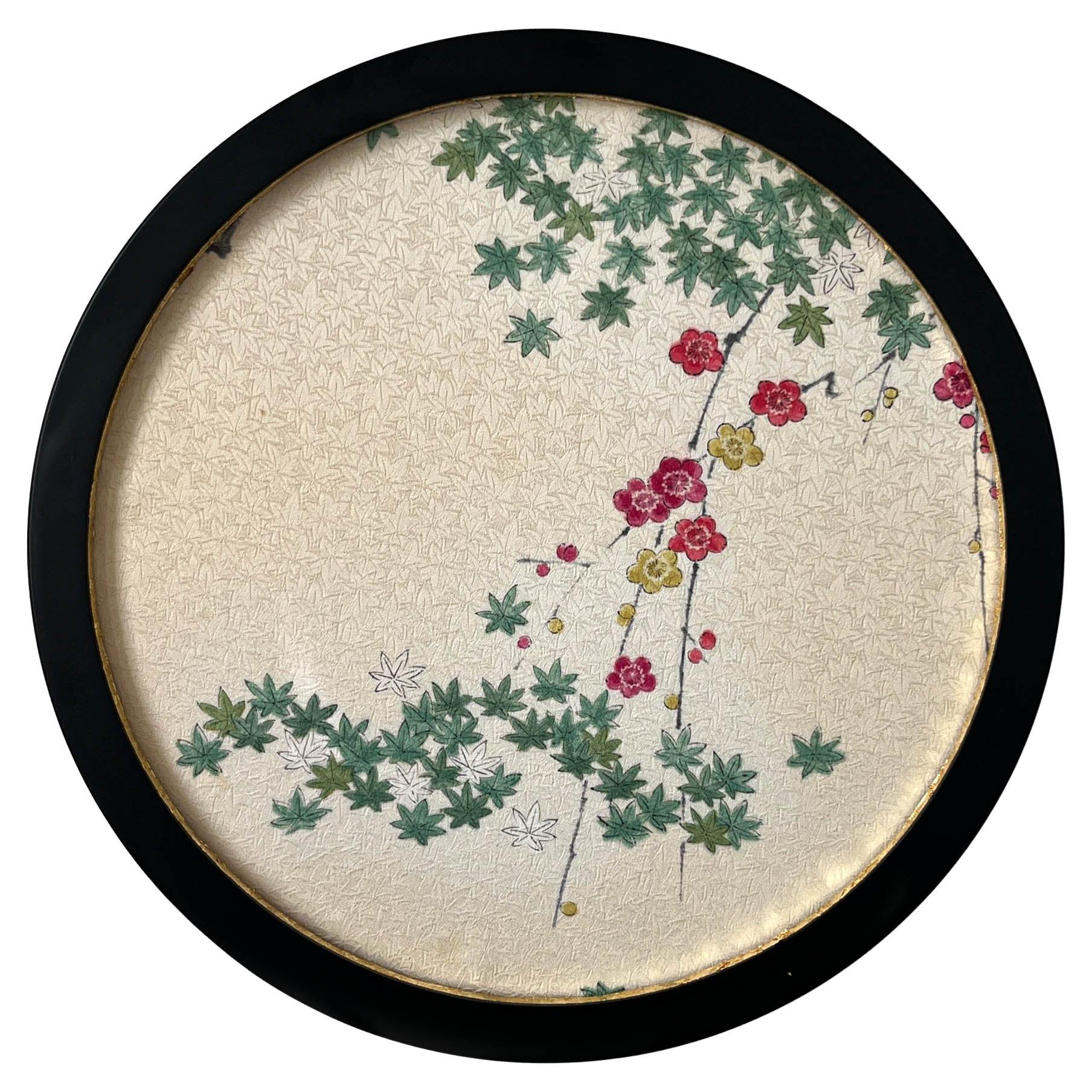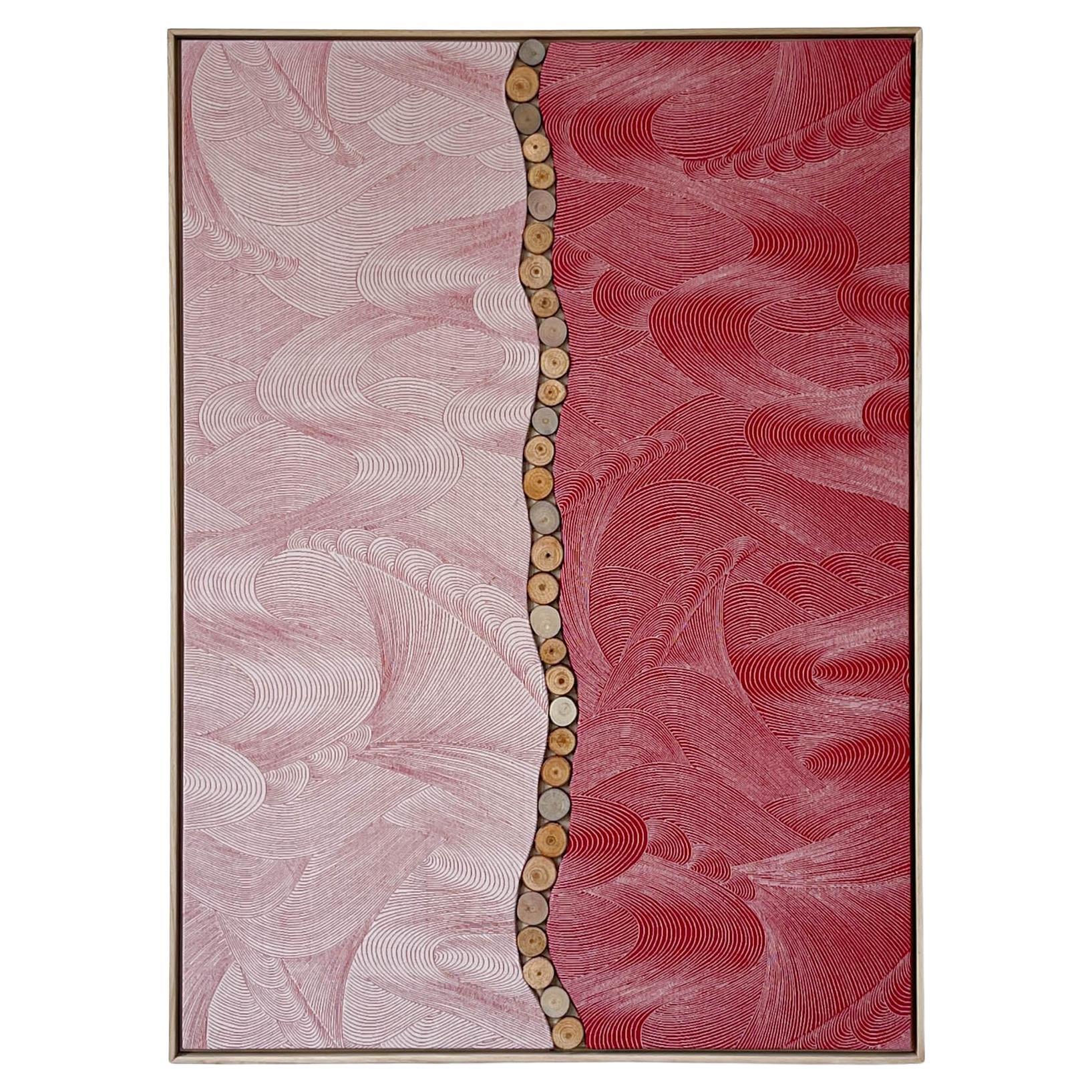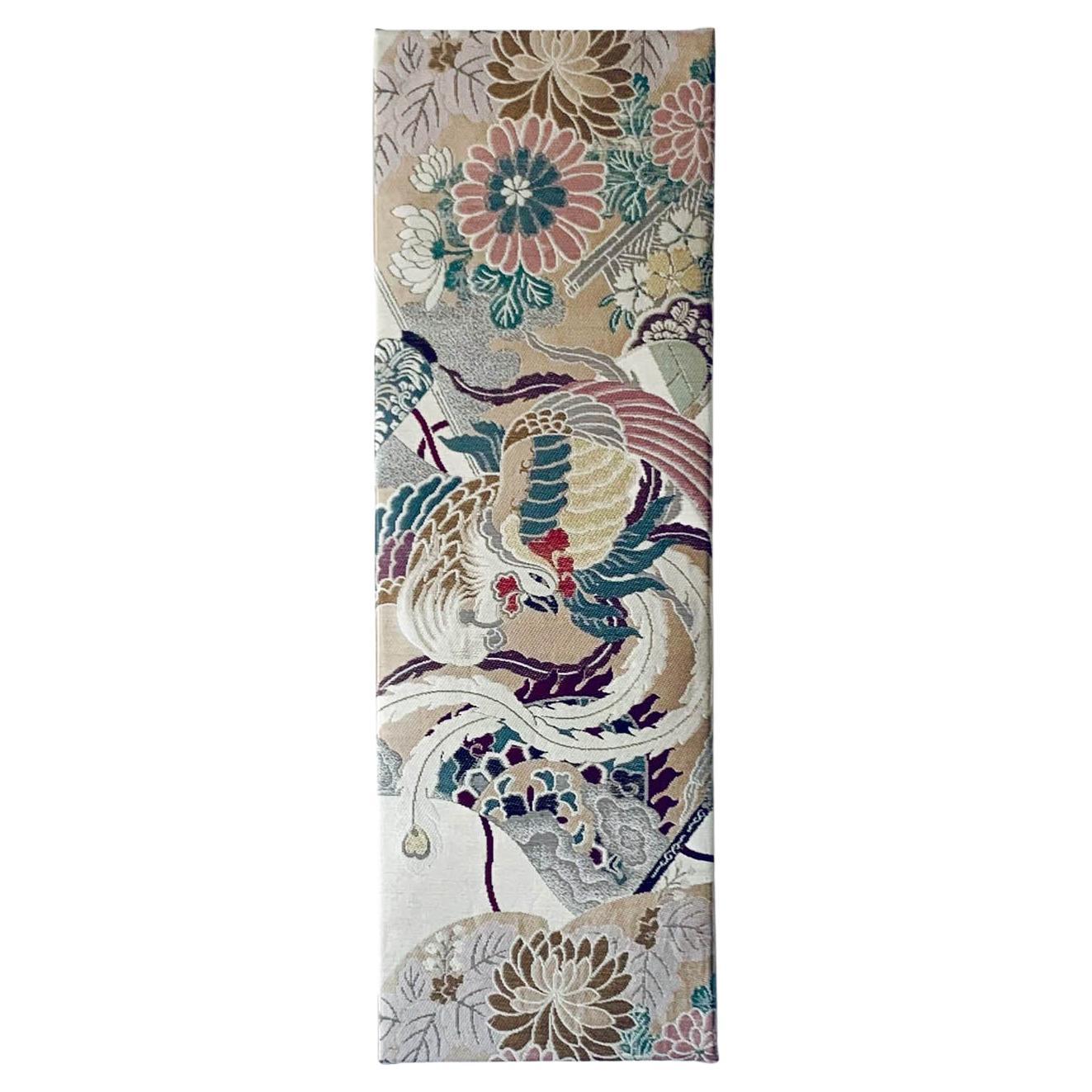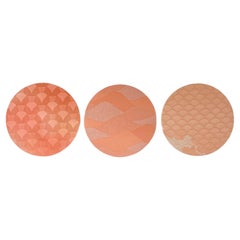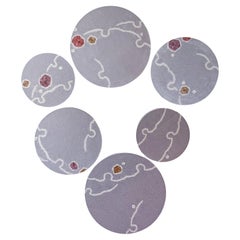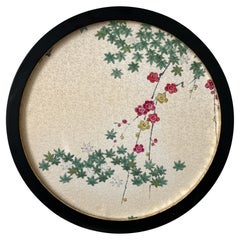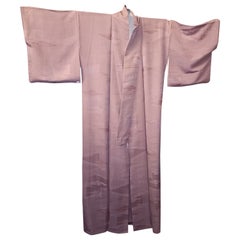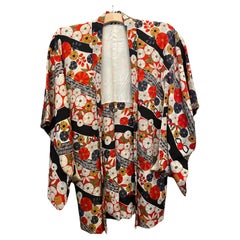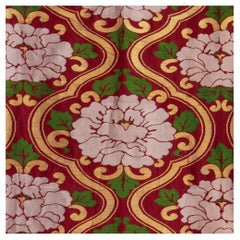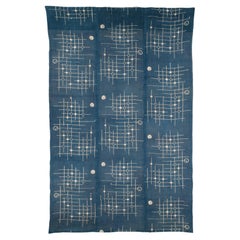Items Similar to Vintage kimono textile art " Plum Gradation " by ikasu Pink, White, Japan
Want more images or videos?
Request additional images or videos from the seller
1 of 21
Vintage kimono textile art " Plum Gradation " by ikasu Pink, White, Japan
$650
£496.96
€572.40
CA$910.85
A$1,016.88
CHF 532.83
MX$12,447.58
NOK 6,766.93
SEK 6,380.35
DKK 4,271.86
About the Item
This canvas featuring a plum color gradient kimono showcases a unique decorative variation of the popular seigaiha (青海波) sea waves pattern.
The artwork got a Mr. & Mrs. Abe Arts & Culture Prize in 2024.
<< Period/Story >>
This canvas is made from upcycled kimono from the late Showa period, likely from around the 1980s.
<< Explanation and meaning of pattern and colors >>
The decoration designed on the ocean waves pattern resembles peacock feathers, adding an oriental ambiance to this unique pattern.
The ocean waves are regarded as an auspicious motif, with endless waves symbolizing a desire for everlasting happiness and a peaceful life for those who possess it.
<< Description of fabric characteristics >>
This piece features a decorative ocean wave pattern known as "Seigaiha," created through a weaving technique called "jimon." In this technique, the pattern emerges not from colors but from the way light reflects off threads at various angles.
In kimono culture, the lining that peeks out from the sleeves and bottom is known as "hakkake." It offers a unique way to appreciate colors and patterns. Sometimes, these rarely seen parts, visible only when the wind blows or while walking, turn out to be the most beautiful in entire kimono. This embodies the concept of "uramasari," a tradition of being "secretly awesome." This canvas is an upcycled version of the hakkake - the kimono lining.
While plain fabrics have become common for hakkake in recent years, this one uses a fabric with a woven pattern, highlighting the meticulous attention to details of the person who originally crafted it.
- Creator:Kimono ikasu (Artist)
- Dimensions:Height: 0.79 in (2 cm)Diameter: 11.82 in (30 cm)
- Style:Japonisme (In the Style Of)
- Materials and Techniques:
- Place of Origin:
- Period:1980-1989
- Date of Manufacture:1980ies
- Condition:
- Seller Location:Setagaya City, JP
- Reference Number:1stDibs: LU10079243793872
About the Seller
No Reviews Yet
Vetted Professional Seller
Every seller passes strict standards for authenticity and reliability
1stDibs seller since 2024
- ShippingRetrieving quote...Shipping from: Setagaya City, Japan
- Return Policy
Authenticity Guarantee
In the unlikely event there’s an issue with an item’s authenticity, contact us within 1 year for a full refund. DetailsMoney-Back Guarantee
If your item is not as described, is damaged in transit, or does not arrive, contact us within 7 days for a full refund. Details24-Hour Cancellation
You have a 24-hour grace period in which to reconsider your purchase, with no questions asked.Vetted Professional Sellers
Our world-class sellers must adhere to strict standards for service and quality, maintaining the integrity of our listings.Price-Match Guarantee
If you find that a seller listed the same item for a lower price elsewhere, we’ll match it.Trusted Global Delivery
Our best-in-class carrier network provides specialized shipping options worldwide, including custom delivery.More From This Seller
View AllVintage kimono textile art "On Coral Waves ~Everlasting~" by ikasu Pink, Japan
By Kimono ikasu
Located in Setagaya City, JP
<< About this canvas >>
This kimono canvas set of three pieces portrays mountains surrounded by the sea. While each of the three pieces is crafted from different kimonos, they all s...
Category
Vintage 1970s Japanese Japonisme Paintings and Screens
Materials
Silk, Canvas
VIntage kimono textile art "Geometry ~Chrysanthemums" by ikasu, white, red Japan
By Kimono ikasu
Located in Setagaya City, JP
This work is inspired by traditional Japanese natural symbolism, and is framed in paulownia wood originally used for a kimono chest-of-drawers.
It is elegantly framed with paulownia...
Category
Vintage 1960s Japanese Japonisme Paintings and Screens
Materials
Silk, Wood
Vintage kimono textile art "Snowflake ~New Beginnings~" by ikasu Purple, Japan
By Kimono ikasu
Located in Setagaya City, JP
Six canvases (Diameter approx. 30cm, 25cm, 20cm) use the fabric taken from antique kimono, its' various parts, to create one harmonious fluid image of a snowflake - a symbol of new b...
Category
Vintage 1970s Japanese Japonisme Paintings and Screens
Materials
Canvas, Silk
Vintage kimono textile art "View from the Window ~Maple&Plum~" by ikasu, Japan
By Kimono ikasu
Located in Setagaya City, JP
This work is a glorious nod to buddhist temples circle windows, with beautiful Japanese garden scape seen outside. Golden leaf on the border of a frame is an expression of light goin...
Category
Vintage 1930s Japanese Japonisme Paintings and Screens
Materials
Gold Leaf
Vintage kimono textile art "Sunset Timelapse ~Ephemerality~" by ikasu Red, Japan
By Kimono ikasu
Located in Setagaya City, JP
The art piece uses two sides - front and reverse - of the same kimono, to show beautiful sea surrounding Japan, in hues and in late sunset, as a timelapse.
The frame for this work is made of paulownia wood taken from antique Kiritansu - chest-of-drawers for kimono.
I use antique kiritansu that can’t be used as furniture anymore to create basis and frames for my works. It adds them even more authentic atmosphere of traditional wabisabi spirit. Can you feel it?
<< Period / Story >>
The kimono used in this piece was originally crafted during Showa period (around 1960ies).
<< Explanation and meaning of pattern and colors >>
Sea waves, depicted in two color variations here, are a symbol of transience and Impermanence in Japanese culture. The ebb and flow of the tides, the ever-changing currents, and the relentless motion of the waves serve as reminders of the fleeting nature of life. This artwork featuring the sea convey themes of impermanence, reminding viewers to cherish the present moment and appreciate the beauty of life's fleeting moments.
The theme of impermanence is strengthen by two colors of the sea - the lighter in early hues and the darker when the sun is just about to set in the sea.
<< About the frame >>
This artwork frame is crafted from paulownia wood, a uniquely Japanese material closely tied to the world of kimonos, and it serves to convey the refined beauty of Japanese nature.
Paulownia wood is known as the lightest wood in Japan, prased for its natural luster, resistance to moisture, and resilience against cracking. Since ancient times, it has been used in crafting furniture, chests, and musical instruments.
Paulownia wood is closely linked to kimono culture. During the Edo period (17th cent.~), it became customary to store cherished kimonos in paulownia chests...
Category
Vintage 1960s Japanese Japonisme Paintings and Screens
Materials
Silk, Wood
Vintage obi textile art "From the Ashes ~Serendipity~" by ikasu Beige, Japan
By Kimono ikasu
Located in Setagaya City, JP
About This Canvas
This canvas has been upcycled from an early 20th-century maru-obi, featuring a subtle yet sophisticated depiction of the phoenix—a legendary symbol of peace and ren...
Category
Vintage 1910s Japanese Japonisme Decorative Art
Materials
Canvas, Silk
You May Also Like
Japanese silk kimono pink grey with patterns
Located in Paris, FR
This is a silk kimono which was made in Showa era around 1970s in Japan.
The kimono is a traditional Japanese garment and the national dress of Japan. The kimono is a wrapped-front garment with square sleeves and a rectangular body, and is worn left side wrapped over right, unless the wearer is deceased. The kimono is traditionally worn with a broad sash, called an obi, and is commonly worn with accessories such as zōri sandals and tabi socks...
Category
Late 20th Century Japanese Showa Antiquities
Materials
Silk
Japanese Silk Haori Poppy Multi Colours 1980s Showa
Located in Paris, FR
This is a silk jacket which was made in Japan.
It was made in Showa era around 1980s.
The haori is a traditional Japanese hip- or thigh-length jacket worn over a kimono. Resembling ...
Category
Vintage 1980s Japanese Showa Antiquities
Materials
Silk
Vintage Japanese Obi Textile, Mid-20th C
Located in Istanbul, TR
An obi in very good condition that can be utilized as a table runner, wall hanging.
Category
Mid-20th Century Japanese Pillows and Throws
Materials
Silk
Early 20th Century Japanese Linen Go-Board Pattern Futon Cover
Located in Point Richmond, CA
Early 20th Century Japanese linen go-board pattern futon cover
A unique example of a game-themed textile, this 3-panel futon cover is woven of very fine...
Category
Early 20th Century Japanese Meiji Textiles
Materials
Hemp
Antique Japanese Brocade Monk's Robe Kesa Meiji Period
Located in Atlanta, GA
A Japanese Kesa (Monk's Vestment) made from thirteen columns of patchworks of shimmering woven brocades. The elaborate motifs feature repetitive elaborat...
Category
Antique Late 19th Century Japanese Meiji Textiles
Materials
Brocade, Silk
Japanese Kimono-Diamond Pattern
Located in Paris, FR
Kimono designs featuring diamond-shaped (hishi-gata) patterns in the 1980s blended traditional Japanese motifs with modern aesthetics. The hishi pattern is a classic Japanese design ...
Category
Late 20th Century Japanese Showa Antiquities
Materials
Silk
More Ways To Browse
Vintage Textile Art
Woven Fabric Art
Japanese Fabric Art
Japanese Kimono
Japanese Used Kimono
Japanese Weaving
Japanese Art Ocean
Upcycle Art
Arts And Crafts Screen
Vintage Kimonos
Vintage Silk Screens
Oriental Screen
White Kimono
Asian Feather Art
Pink Peacocks
Japanese Kimono Fabric
Japanese Peacock
Asian Paintings On Fabric
